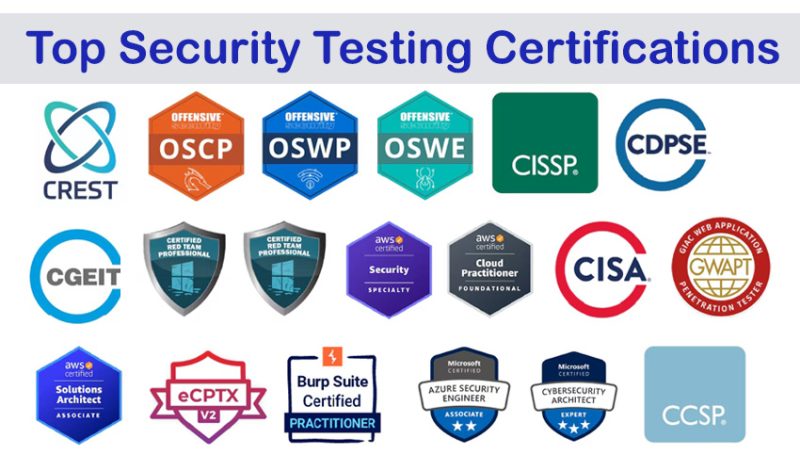1. Certified Ethical Hacker (CEH)
-
- Offered by: EC-Council
CEH certification focuses on identifying and understanding hacking tools and techniques to ethically evaluate and enhance the security of systems. It covers various domains such as reconnaissance, system hacking, and malware threats.
2. Offensive Security Certified Professional (OSCP)
-
- Offered by: Offensive Security
OSCP is renowned for its rigorous practical exam that certifies individuals in real-world penetration testing and ethical hacking skills. It emphasizes hands-on experience and problem-solving abilities in a controlled environment.
3. Certified Information Systems Security Professional (CISSP)
-
- Offered by: (ISC)²
CISSP encompasses a wide range of security topics, including security testing and assessment. It is ideal for professionals aiming to validate their expertise in managing and implementing comprehensive cybersecurity programs.
4. GIAC Penetration Tester (GPEN)
-
- Offered by: Global Information Assurance Certification (GIAC)
GPEN certifies an individual’s ability to conduct thorough penetration tests. It covers in-depth penetration testing methodologies, legal issues, and best practices, ensuring professionals are well-equipped to assess and secure systems.
5. Certified Penetration Testing Engineer (CPTE)
-
- Offered by: Mile2
CPTE focuses on practical penetration testing methodologies and practices, including network and application security. It prepares professionals to identify vulnerabilities, exploit them ethically, and understand the implications of security breaches.
6. CREST Registered Penetration Tester (CREST CRT)
-
- Offered by: CREST
CREST CRT certifies penetration testers with proven expertise in identifying and mitigating security vulnerabilities. It covers advanced testing techniques and is recognized globally for its rigorous assessment standards.
7. Certified Information Systems Auditor (CISA)
-
- Offered by: ISACA
CISA focuses on auditing, control, and assurance within IT environments. It certifies professionals in the skills necessary to assess vulnerabilities, report on compliance, and institute controls within enterprise environments.
8. Certified Cloud Security Professional (CCSP)
-
- Offered by: (ISC)²
CCSP demonstrates expertise in cloud security architecture, design, operations, and service orchestration. It’s ideal for professionals involved in cloud security, ensuring they can apply best practices to cloud security environments.
9. GIAC Web Application Penetration Tester (GWAPT)
-
- Offered by: Global Information Assurance Certification (GIAC)
GWAPT certifies an individual’s ability to conduct web application penetration tests. It covers a wide array of testing techniques specific to web applications, ensuring professionals can identify and mitigate web-based threats.
10. Certified Red Team Professional (CRTP)
-
- Offered by: Pentester Academy
CRTP focuses on red team operations and adversarial attack simulations. It teaches professionals to emulate real-world attack scenarios and provides the skills to assess and improve the security posture of organizations.
11. Certified Exploit Researcher and Advanced Penetration Tester (GXPN)
-
- Offered by: Global Information Assurance Certification (GIAC)
GXPN certifies professionals in advanced penetration testing and exploit research. It covers advanced techniques for testing network security and developing exploits, making it ideal for those focused on high-level penetration testing.
12. Certified Application Security Engineer (CASE)
-
- Offered by: EC-Council
CASE focuses on secure software development practices and methodologies. It certifies professionals in integrating security into the lifecycle of software development, ensuring applications are secure from design to deployment.
13. Certified Wireless Security Professional (CWSP)
-
- Offered by: CWNP (Certified Wireless Network Professionals)
CWSP focuses on wireless network security, covering topics such as WLAN security, threat assessment, and mitigation techniques. It is ideal for professionals involved in securing wireless networks.
14. Offensive Security Certified Expert (OSCE)
-
- Offered by: Offensive Security
OSCE is an advanced certification focusing on more complex penetration testing and exploit development. It requires a deeper understanding of network and application vulnerabilities and emphasizes hands-on testing skills.
15. Certified Information Security Manager (CISM)
-
- Offered by: ISACA
CISM is geared towards professionals managing enterprise information security programs. It covers governance, risk management, and incident management, integrating security testing into overall security strategies.
16. CompTIA PenTest+
-
- Offered by: CompTIA
PenTest+ validates intermediate skills required for a career in penetration testing. It covers planning, scoping, and managing vulnerabilities, emphasizing practical, hands-on penetration testing techniques.
17. Certified AppSec Practitioner (CASP)
-
- Offered by: Practical DevSecOps
CASP certifies individuals in application security practices, focusing on integrating security into DevOps environments. It emphasizes secure coding practices, threat modeling, and application security testing.
18. Certified SOC Analyst (CSA)
-
- Offered by: EC-Council
CSA certification focuses on the skills needed to work in a Security Operations Center (SOC). It covers monitoring, threat detection, and incident response, emphasizing the importance of security testing in a SOC environment.
19. EC-Council Certified Security Analyst (ECSA)
-
- Offered by: EC-Council
ECSA is a continuation of CEH, providing deeper insights into penetration testing methodologies. It emphasizes report writing and the ability to assess and analyze the results of penetration tests effectively.
20. Certified Forensic Analyst (GCFA)
-
- Offered by: Global Information Assurance Certification (GIAC)
GCFA focuses on digital forensics and incident response. It certifies professionals in conducting forensic investigations and understanding the implications of security breaches, including how to test for and identify vulnerabilities.
Conclusion
Protection of systems and networks have become critical in the contemporary society due to the increasing speed of advancement in the digital world. Security testing certification is very important as it helps the professionals to imbibed knowledge and skills concerning the various flaws that are likely to occur. Some of these basic certifications include; Certified Ethical Hacker (CEH) and Offensive Security Certified Professional (OSCP), super specialize certifications include; Certified Wireless Security Professional (CWSP) and the Certified Forensic Analyst (GCFA).
An added advantage of each certification is that it has a concentrated area of interest hence professionals can choose specific areas to senior in their learning and the career. Regardless of the speciality – penetration testing, secure software development, cloud security or incident response, these certifications guarantee, that a professional is ready to face the current and future threats of digital world.
Furthermore, it is also noteworthy to realize that companies engaged in security testing gain significantly when key staff possess these professional certifications. Certified people provide a confirmation of their skills and awareness of recent threats and approaches to testing, which is important for a security testing firm since such a professional can become an asset. The services of these companies depend on personnel with adequate certification to ensure comprehensive and efficient security audits, which serve to protect the assets of the clients.
Professionals balance both increased personal abilities and employment opportunities when they invest in these certifications and make the Internet a safer place. Notably, it is evident that as threats advance, there will be an increasing need of certified security testers and thus; these certifications are a valuable toolkit, when dealing with these threats. There is a great advantage to businesses in related fields, especially security testing companies, who can benefit from having certified professionals on their teams since it will enable the companies to offer their clients a high level of security services.
Read Dive is a leading technology blog focusing on different domains like Blockchain, AI, Chatbot, Fintech, Health Tech, Software Development and Testing. For guest blogging, please feel free to contact at readdive@gmail.com.





